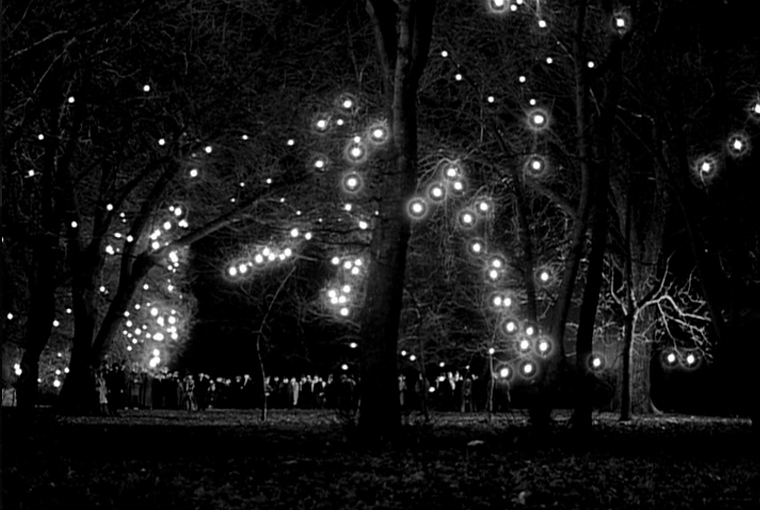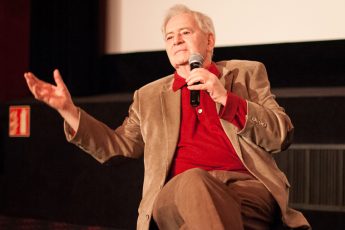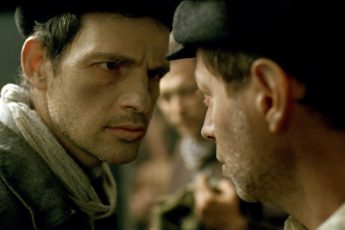Modernity & Co.
Ildikó Enyedi’s My Twentieth Century (Az én XX. századom, 1989)
Vol. 33 (September 2013) by Konstanty Kuzma
If you’ve ever seen an Ildikó Enyedi film, you know how difficult it is to give an adequate summary of her plots (Julia Zelman took on the challenge in her critique of Simon, the Magician for this journal). Story-wise, My Twentieth Century follows two sisters in their sharply dissimilar lives: one, Dora, becoming a lavish courtesan; Lily, the other one, a feminist revolutionary who struggles to overcome her apathy towards men – both played by the magnificent and gorgeous Dorothy Segda. Following a difficult childhood which is shown but shortly, unknowingly they both wind up on the Orient Express – Dora in the first-class carriage where she is wildly wooed, Lily in the second-class carriage where she receives an illegal package. The story continues in similar fashion with Dora looking for cheap entertainment and solvent men, and Lily attempting to reconcile her ideological convictions with her tacit yearning for romance. On a more abstract level, however, the film addresses everything from modernity to sex, with every episode from the sisters’ lives having another two or three visual footnotes which divert the film from a simple storyline structure towards erratic, philosophical contemplation.
A question that arises very early (indeed, the moment one sees the title of the film) is this: why the “my” in front of “20th century”? In fact, the possessive determiner in the title can easily be overlooked because the film’s spatial shifts in the first ten minutes are so extreme (New Jersey – Budapest – Paris – Burma – Hamburg – New York) that one wonders whether it is simply a sign of false modesty. Is Enyedi trying to jumble together an analysis of the 20th century? No, but she is trying to tell us how preposterous such an endeavor would be: in an early scene, a dog tied up Clockwork Orange-style is shown random 20th century images on a screen (flowers, people, a helicopter, Tolstoy, workers etc.), but shows no reaction until he spots his feline enemies. In spite of this humble reservation, Enyedi does manage to offer a sneak-peek into the wonders (the invention of the light-bulb, cinema, and the telegraph) and maladies (social inequality and unrest, the invention of weapons of mass-destruction) of modernity, meanwhile illustrating the sluggish progress in approaching gender equality. Knowingly, the movie offers a subjective and relative viewpoint on modernity, hence the postmodern marker in the title (PS in case you were wondering, there appears to be no recognizable reference to 1989, which is when the film premiered).
Clearly, Lily’s and Dora’s complementary dichotomy has multiple applications: feminism vs. self-objectification; revolutionary proletarianism vs. bourgeoisie; cramped timidness vs. outgoing ebullience. While this dialectical critique is likeable and certainly accurate to some extent, Enyedi doesn’t treat such contrasts as being rigidly true. In fact, it doesn’t take long to realise that the director doesn’t position herself on either extreme: while Lily gets more screen-time and is overall the more complex character, Dora’s squalid escapades are met without moralizing condescendence. There is no “morning-after” scene where Dora is punished for her disreputable life-style, and it’s Lily who stars in the most painful scene of the film. Z. – with whom Lily has a few innocent encounters before he sleeps with Dora, mistaking them for the same person – meets the innocuous sister on the street and offers her to go to his place, but nothing of his hypocritically suave etiquette from their previous meetings is left. Treated without affection or the least bit of respect, Lily’s belated romantic experience is degrading and empty, a thing which even the cavalier macho wants “to get over with”.
Indeed, it seems rather unlikely that Z. (Oleg Jankovszki) would fail to realise he’s dealing with another person when he finally seduces Lily, but Enyedi’s ingenuous benevolence allows the viewer to leave such “rational” scepticism behind. Her conistent forgiveness towards her characters and her Franciscan predilection for animals should break even the greatest cynics – Enyedi strives for reconciliation. In her world, terrorists are disabused before their actions have fatal consequences, egoistical men are faced with the inhumane absurdity of objectification, and sisters who live on opposite moral and economical extremes of society are elated when finally reunited. Inside the maze that’s called “modernity,” amid bourgeois exploitation and sexist theoretization, Enyedi’s poetic message to her audience is blatantly straightfoward: be ethical.




Leave a Comment